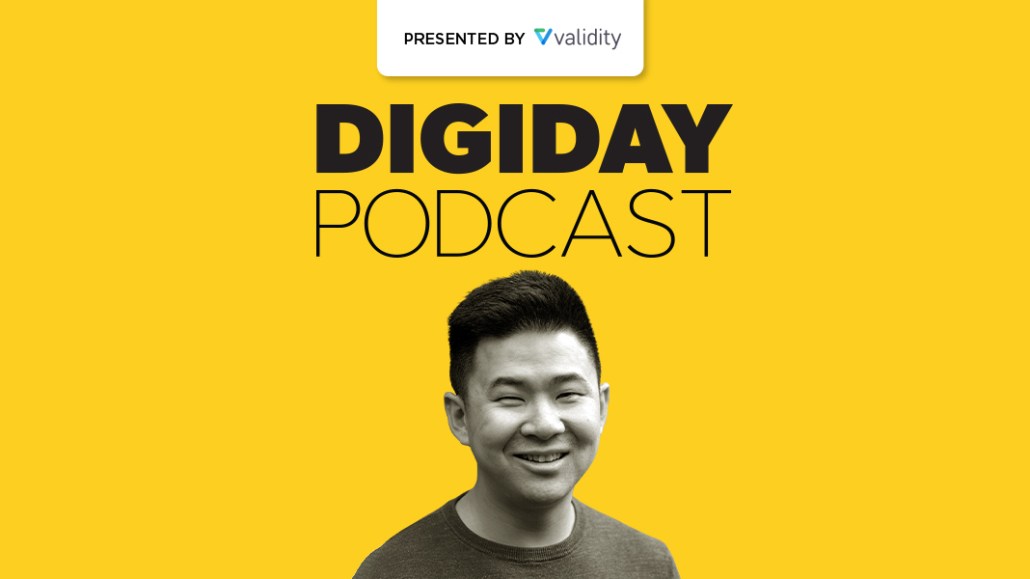‘All taking a chance on each other’: Jasper Wang on Defector Media’s collective ownership structure

Subscribe: Apple Podcasts | Stitcher | Google Play | Spotify
In recent years, unionizing newsrooms has given journalism-focused media companies a bit more say over how their workplaces are run. But Defector Media is something else entirely.
The group of 18 former Deadspin employees — who quit the company after a bitter clash with management last year — have launched the company with a much more collective ownership structure. Like its predecessor, Defector Media focuses on sports and culture.
With a two thirds majority, they have the power to vote out the site’s editor-in-chief — or this week’s guest on the Digiday Podcast, Defector’s vp of revenue and operations, Jasper Wang.
“Is it a little bit more stressful? Sure. But they’re all taking a chance on each other, and they’re taking a chance on me. So I gotta bet on myself, too,” Wang said on the podcast.
“I think probably more executives should feel on their toes and beholden to the experiences that their employees are having.”
For now, employees and shareholders are one and the same. Anyone who joins the company will have the same voting rights.
Defector also provides full transparency on how much everyone is making, which “has driven some awkward conversations. But you’re just getting that out at the beginning rather than along the way,” Wang said.
Beyond its unique housekeeping model, the site is betting on subscriptions. Defector, which launched just this month, had a “dare to dream” target of 30,000 paying members by the end of the year, Wang said, for which they’re ahead of schedule.
Part of Wang’s calculus is that Deadspin’s brand resided not just in the Gawker umbrella that owned it, but in the names of its writers, most of whom are now at Defector.
By the same token that Substack is proving highly remunerative for certain journalists on staff and the Deadspin pedigree should attract subscribers who miss the old site’s irreverence and coverage of both sports and politics.
“It was clear that the dedicated following would be there,” Wang said.
Here are highlights from the conversation, which have been lightly edited for clarity.
A four-part set of insights
“One is, we reject the idea that the media property brand is all that matters. The byline matters, the collective group of writers — that matters. People will follow the writers. We see that in the way Substack is gaining success as well. [Second], there was a clear need in the marketplace. There’s pretty little by way of accountability journalism in the sports space right now. ESPN The Magazine is gone, Sports Illustrated is pretty different. So there’s a gap in the sports coverage that’s antagonistic, almost, to power and authority. Third, I think media consumers are just more and more comfortable with paying for content. This is a trend that gets talked about on your podcast, the speed at which subscriptions have grown especially over the last six months with the pandemic.
And finally, like a lot of industries, the technology and surrounding ecosystem make it theoretically easier than every to put together a revenue generating company pretty quickly. We outsource and partner on basically everything. At the moment, I’m the one full-time operations person in house. We have an array of other partners and lawyers and accountants and insurers and folks who have media expertise.
The hardest part is just the people willing to hold hands and jump together. Once you have that, building out a business scaffolding is probably easier than it’s ever been.”
How collective ownership works
“At the moment employees and shareholders are one and the same. But going forward, we still want the focus to be on employees. Everybody who joins will get basically the same voting rights in the company and the same compensation sharing as everybody else.
The sustainability question
“We’re co-owners in the business and we’re sort of thinking of compensation like a law firm [but] an order of magnitude smaller. We take a small salary throughout the year and then we settle up throughout a year where we can pay it out. People keep asking ‘what’s the number where you guys are sustainable?’ And the answer is, we’re sustainable now. It’s just a matter of what our team can tolerate in terms of their take-home compensation.”
More in Media

Digiday+ Research: Dow Jones, Business Insider and other publishers on AI-driven search
This report explores how publishers are navigating search as AI reshapes how people access information and how publishers monetize content.

In Graphic Detail: AI licensing deals, protection measures aren’t slowing web scraping
AI bots are increasingly mining publisher content, with new data showing publishers are losing the traffic battle even as demand grows.

In Graphic Detail: The scale of the challenge facing publishers, politicians eager to damage Google’s adland dominance
Last year was a blowout ad revenue year for Google, despite challenges from several quarters.





